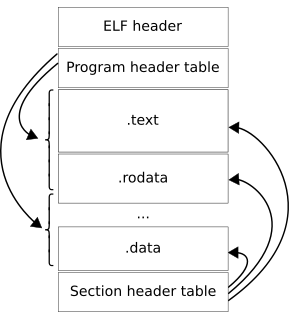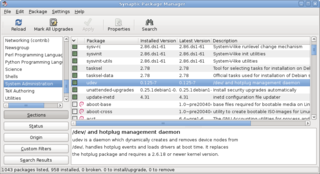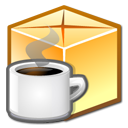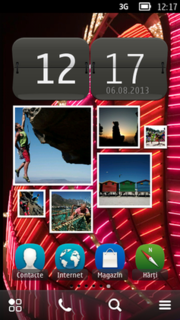Related Research Articles

In computing, the Executable and Linkable Format, is a common standard file format for executable files, object code, shared libraries, and core dumps. First published in the specification for the application binary interface (ABI) of the Unix operating system version named System V Release 4 (SVR4), and later in the Tool Interface Standard, it was quickly accepted among different vendors of Unix systems. In 1999, it was chosen as the standard binary file format for Unix and Unix-like systems on x86 processors by the 86open project.

A package manager or package-management system is a collection of software tools that automates the process of installing, upgrading, configuring, and removing computer programs for a computer's operating system in a consistent manner.
Helix DNA is a project to produce computer software that can play audio and video media in various formats, aid in producing such media, and serve them over a network. It is intended as a largely free and open-source digital media framework that runs on numerous operating systems and processors and was started by RealNetworks which contributed much of the code. The Helix Community is an open collaborative effort to develop and extend the Helix DNA platform.

A JAR is a package file format typically used to aggregate many Java class files and associated metadata and resources into one file for distribution.

Portage is a package management system originally created for and used by Gentoo Linux and also by Chrome OS, Calculate, Sabayon, and Funtoo Linux among others. Portage is based on the concept of ports collections. Gentoo is sometimes referred to as a meta-distribution due to the extreme flexibility of Portage, which makes it operating-system-independent. The Gentoo/Alt project is concerned with using Portage to manage other operating systems, such as BSDs, macOS and Solaris. The most notable of these implementations is the Gentoo/FreeBSD project.
deb is the format, as well as extension of the software package format for the Debian Linux distribution and its derivatives.

Clam AntiVirus (ClamAV) is a free software, cross-platform and open-source antivirus software toolkit able to detect many types of malicious software, including viruses. One of its main uses is on mail servers as a server-side email virus scanner. The application was developed for Unix and has third party versions available for AIX, BSD, HP-UX, Linux, macOS, OpenVMS, OSF (Tru64) and Solaris. As of version 0.97.5, ClamAV builds and runs on Microsoft Windows. Both ClamAV and its updates are made available free of charge.

Installer is an application included in macOS that extracts and installs files out of .pkg packages. It was created by NeXT, and is now maintained by Apple Inc. Its purpose is to help software developers create uniform software installers.
Mobile malware is malicious software that targets mobile phones or wireless-enabled Personal digital assistants (PDA), by causing the collapse of the system and loss or leakage of confidential information. As wireless phones and PDA networks have become more and more common and have grown in complexity, it has become increasingly difficult to ensure their safety and security against electronic attacks in the form of viruses or other malware.
Ports collections are the sets of makefiles and patches provided by the BSD-based operating systems, FreeBSD, NetBSD, and OpenBSD, as a simple method of installing software or creating binary packages. They are usually the base of a package management system, with ports handling package creation and additional tools managing package removal, upgrade, and other tasks. In addition to the BSDs, a few Linux distributions have implemented similar infrastructure, including Gentoo's Portage, Arch's Arch Build System (ABS), CRUX's Ports and Void Linux's Templates.
Carbide.c++ is a software development tool for C++ development on Symbian OS. It is used to develop phones that use the OS, as well as applications that run on those phones. It is based on the Eclipse IDE platform enhanced with extra plug-ins to support Symbian OS development. The product is provided by the Symbian Foundation under an open source model. In April 2009, Nokia transferred Carbide.c++ and many other software developer tools to the Symbian Foundation. Members of the Symbian community now manage and contribute code to the Carbide.c++ product.

PeaZip is a free and open-source file manager and file archiver for Microsoft Windows, ReactOS, Linux and BSD made by Giorgio Tani. It supports its native PEA archive format and other mainstream formats, with special focus on handling open formats. It supports 211 file extensions.
The following is a comparison of e-book formats used to create and publish e-books.
.pkg (package) is a filename extension used for several file formats that contain packages of software and other files to be installed onto a certain device, operating system, or filesystem, such as the macOS, iOS, PlayStation Vita, PlayStation 3, and PlayStation 4.

EPUB is an e-book file format that uses the ".epub" file extension. The term is short for electronic publication and is sometimes styled ePub. EPUB is supported by many e-readers, and compatible software is available for most smartphones, tablets, and computers. EPUB is a technical standard published by the International Digital Publishing Forum (IDPF). It became an official standard of the IDPF in September 2007, superseding the older Open eBook standard.

RPM Package Manager (RPM) is a free and open-source package management system. The name RPM refers to .rpm file format and the package manager program itself. RPM was intended primarily for Linux distributions; the file format is the baseline package format of the Linux Standard Base.

Symbian is a discontinued mobile operating system (OS) and computing platform designed for smartphones. Symbian was originally developed as a proprietary software OS for PDAs in 1998 by the Symbian Ltd. consortium. Symbian OS is a descendant of Psion's EPOC, and was released exclusively on ARM processors, although an unreleased x86 port existed. Symbian was used by many major mobile phone brands, like Samsung, Motorola, Sony Ericsson, and above all by Nokia. It was also prevalent in Japan by brands including Fujitsu, Sharp and Mitsubishi. As a pioneer that established the smartphone industry, it was the most popular smartphone OS on a worldwide average until the end of 2010—at a time when smartphones were in limited use—when it was overtaken by iOS and Android. It was notably not as popular in North America.
PackageForge is a commercial graphical installation and packaging software tool for Symbian OS based smartphones. PackageForge allows developers to graphically create software installation packages that can be installed to a Symbian OS based phone. After installation a user can start using the installed software application.
References
- ↑ http://www.symbiansigned.com Archived 2012-03-24 at the National and University Library of Iceland
- ↑ "Symbian software installation & packaging documentation". 2010-10-05. Retrieved 2010-10-05.[ permanent dead link ]
- ↑ "Tools for Creating SIS files description". 2010-10-05. Retrieved 2010-10-05.